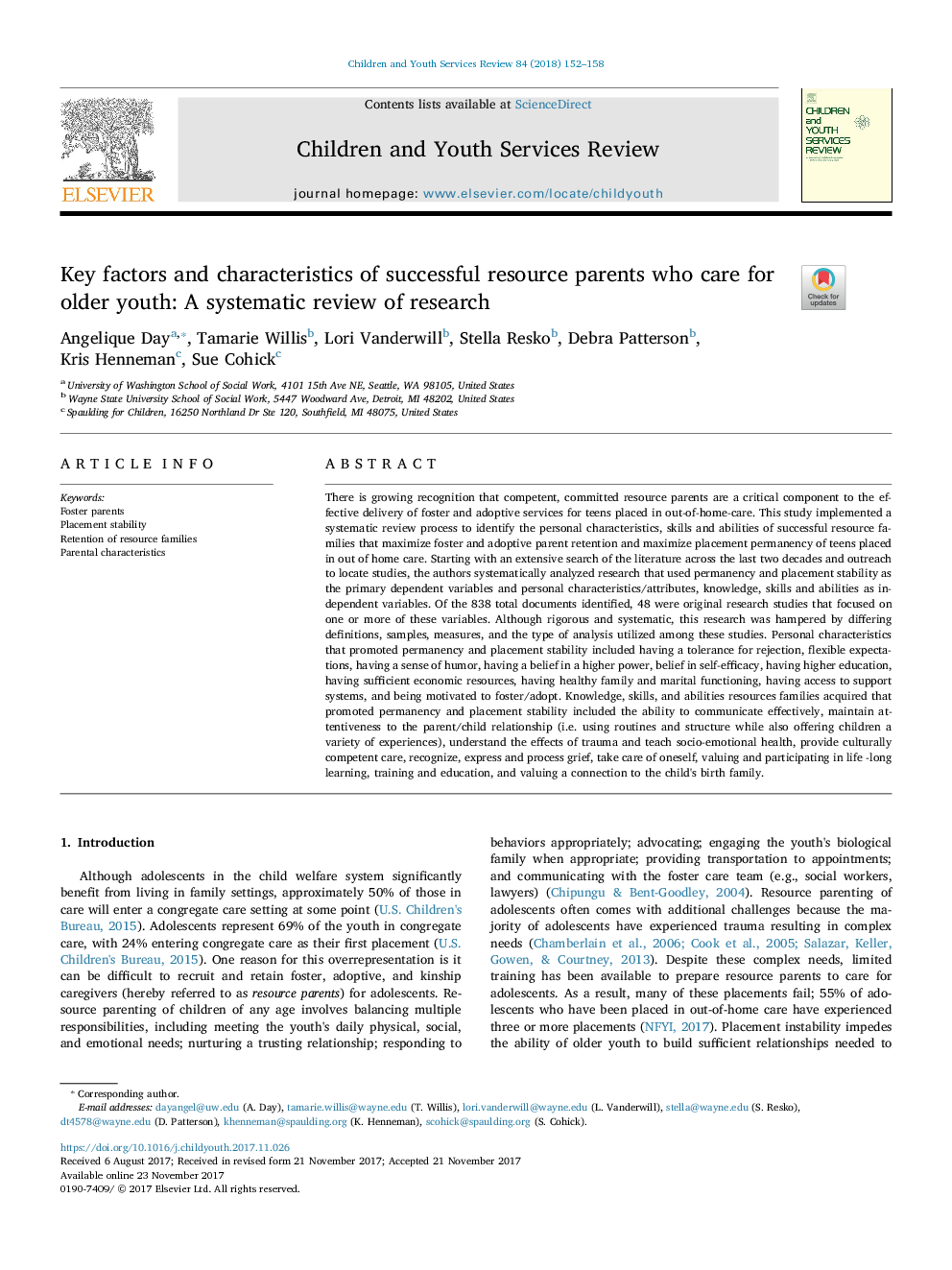ترجمه فارسی عنوان مقاله
عوامل کلیدی و ویژگی های والدین موفق والدین که برای جوانان مسن تر مراقبت می کنند: یک بررسی سیستماتیک از تحقیقات
عنوان انگلیسی
Key factors and characteristics of successful resource parents who care for older youth: A systematic review of research
| کد مقاله | سال انتشار | تعداد صفحات مقاله انگلیسی |
|---|---|---|
| 129347 | 2018 | 7 صفحه PDF |
منبع

Publisher : Elsevier - Science Direct (الزویر - ساینس دایرکت)
Journal : Children and Youth Services Review, Volume 84, January 2018, Pages 152-158
ترجمه کلمات کلیدی
پدر و مادر فاستر، پایداری قرار دادن حفظ منابع خانواده، خصوصیات والدین،
کلمات کلیدی انگلیسی
Foster parents; Placement stability; Retention of resource families; Parental characteristics;
ترجمه چکیده
به رسمیت شناختن در حال رشد است که پدر و مادر صالح و متعهد منابع جزء حیاتی برای ارائه موثر از خدمات نگهداری و پذیرش برای نوجوانان قرار داده شده در مراقبت از منزل وجود دارد. این مطالعه یک فرآیند بررسی سیستماتیک را برای شناسایی ویژگی های فردی، مهارت ها و توانایی خانواده های موفق خانواده انجام داد که به حداکثر رساندن نگهداری پدر و مادر و حمایت از والدین و به حداکثر رساندن دائم قرار دادن نوجوانانی که در خارج از خانه مراقبت می کنند، اجرا شد. نویسندگان به طور سیستماتیک تحقیقات خود را با استفاده از جستجوی گسترده ای از ادبیات در دو دهه گذشته و ارائه خدمات برای یافتن مطالعات انجام دادند که به عنوان متغیرهای اصلی اولیه و ویژگی های فردی، دانش، مهارت ها و توانایی ها به عنوان متغیرهای مستقل مورد استفاده قرار گرفتند. از 838 کل اسناد شناسایی شده، 48 مطالعه اصلی پژوهشی بود که بر روی یکی یا بیشتر از این متغیرها تمرکز داشتند. اگر چه دقیق و منظم، این تحقیق با تعاریف مختلف، نمونه ها، اندازه گیری ها و نوع تحلیل مورد استفاده در میان این مطالعات متوقف شد. ویژگی های شخصی که ثبات و پایداری را به وجود آوردند شامل تحمل پذیری، انتظارات انعطاف پذیر، حس شوخ طبعی، داشتن اعتقاد به قدرت بیشتر، اعتقاد به خودآمدی، داشتن تحصیلات عالی، داشتن منابع اقتصادی کافی، داشتن خانواده سالم و عملکرد زناشویی، داشتن دسترسی به سیستم های پشتیبانی، و انگیزه برای تقویت / پذیرش. دانش، مهارت ها و توانایی خانواده منابع به دست آورد که تداوم پایداری و ثبات قرار دادن شامل توانایی برای ارتباط موثر، حفظ توجه به رابطه پدر و مادر (به عنوان مثال استفاده از روال و ساختار در حالی که همچنین ارائه کودکان تجربیات مختلف)، درک اثرات تروما و تدریس سلامت اجتماعی و عاطفی، ارائه مراقبت های صالحیتی فرهنگی، تشخیص، ابراز و درمان غم و اندوه، مراقبت از خود، ارزیابی و مشارکت در یادگیری طول عمر، آموزش و تعلیم و ارزیابی ارتباط با خانواده تولد کودک است.

